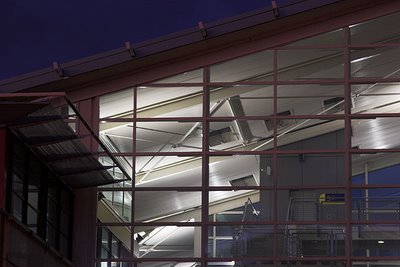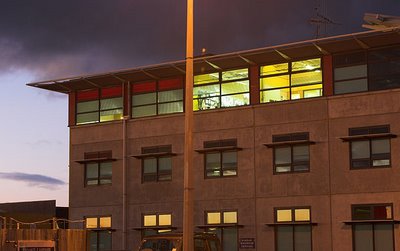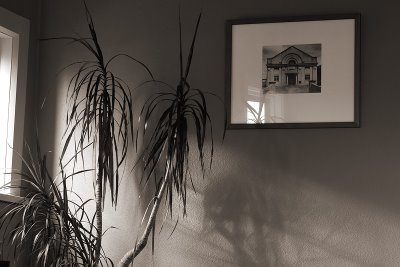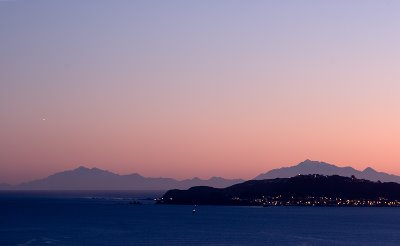“The city is a fact in nature, like a cave, a run of mackerel, or an ant heap. But it is also a conscious work of art, and it holds within its communal framework many simpler and more personal forms of art. Mind takes form in the city; and in turn, urban forms condition mind.”
—Lewis Mumford
In this cold, even the light seems brittle, like old bones on a frozen beach. The straightness of light—its refusal to bend—seems more apparent.  Everything has hard edges, angles, corners; I walk into town, directly into the mid afternoon sun, squinting because the light’s so piercing, or the air’s so cold. Possibly both.
Everything has hard edges, angles, corners; I walk into town, directly into the mid afternoon sun, squinting because the light’s so piercing, or the air’s so cold. Possibly both.
What is a city? Buildings, streets, cars, people, all aggregated? This perspective views cities as primarily physical; made up of stuff—the stuff of cities. But a different view sees cities as processes, as aggregations of ideas, as closely connected relationships. Sometimes you hear cities described as having a particular soul—or lacking one. And the heart of a city is not necessarily its geographical centre. A city is not only organic.
Another day, and I look out from the behind the louvred windows of the Palmerston North City Library, through grey rain across rooftops. Below, occasional pedestrians walk along George Street, past the Deli and the designer boutiques. Past the Mao Bar with its bright red patio umbrellas: a geometry of vermillion warmth in the drab light, serving no function other than this, the ornamental—the umbrellas shelter beneath the eaves sheltering the footpath—but it’s enough. Colour like this can’t be considered too important on such a dismal day. Some of the passersby seem to have a definite purpose in mind; others amble, perhaps a little lost in their thoughts. Everywhere in this city, people right now are thinking about things from the mundane and pragmatic to the incandescent and esoteric. Some think about the same, or similar, things; some think about other people; some think of what was, some of what might be; some wonder what to buy for dinner. If you could draw a map of the city as a diagram of the connections between these thoughts, would you recognise the city? And would you know whether this city was alive and healthy or beginning its decline, heading towards eventual abandonment and final ruin?
Everywhere in this city, people right now are thinking about things from the mundane and pragmatic to the incandescent and esoteric. Some think about the same, or similar, things; some think about other people; some think of what was, some of what might be; some wonder what to buy for dinner. If you could draw a map of the city as a diagram of the connections between these thoughts, would you recognise the city? And would you know whether this city was alive and healthy or beginning its decline, heading towards eventual abandonment and final ruin?
I remember travelling by bus through industrial Tokyo in the remains of the day. Rust-stained pipework crawling over walls like a diagram with nodes made of valves and joints and spoked iron wheels. Razor wire, shredded paper wrapped around it. A bridge over a miasmic river. Skyscrapers in clusters on the smoky orange horizon; the city going on forever. The sense that this darkening area we were speeding through had already been abandoned and was now inhabited only by what had been left behind or had crept in unnoticed. In a representation of relationships, a diagram of connected thoughts, what would this look like? An empty space? A void? A faded patch in a multicoloured quilt?
Saturday night in the city, but here in a cul-de-sac in the suburbs it’s quiet. A breeze in winter branches; the sound of cars in the distance— boy racers.  Occasionally, a far-off clamour of shouting. Nothing intrusive. The cat door rattles, then Molly appears on the bed, wanting to hongi [1], her fur damp and her paws cold. The best sounds in the world just before you drift into dreams are rain on an iron roof, the sound of moving water—the sea or a river—and a cat purring. In the heart of a city you can hope only for the first and last.
Occasionally, a far-off clamour of shouting. Nothing intrusive. The cat door rattles, then Molly appears on the bed, wanting to hongi [1], her fur damp and her paws cold. The best sounds in the world just before you drift into dreams are rain on an iron roof, the sound of moving water—the sea or a river—and a cat purring. In the heart of a city you can hope only for the first and last.
How do you represent thoughts or relationships? Should you represent the connections, and if so, between what? Between thinkers or thoughts? Perhaps you should focus on the intensity, the energy? “Should”, of course, is not a suitable word—I should have said, “could.” These questions are meant to provoke responses, not answers.
Perhaps this is what artists do best. An artist, intrigued with the idea of a city as a nexus of  ideas, as a pattern of thoughts and relationships, might translate the idea into an expression of what seems impossible to pin down satisfactorily. It’s likely the artist, pressed to explain, would shrug, stumble over words, and finally suggest that the work is the explanation, or that the intention—as in all works of art—is not to explain but to evoke.
ideas, as a pattern of thoughts and relationships, might translate the idea into an expression of what seems impossible to pin down satisfactorily. It’s likely the artist, pressed to explain, would shrug, stumble over words, and finally suggest that the work is the explanation, or that the intention—as in all works of art—is not to explain but to evoke.
I’m left wondering, though. What might such a work look like? The shape and colour of a dream; the texture of imagination? Asked for a best guess, I’d probably reply, “The depths of a human brain.”
Notes:
For the last month I've been looking after a house and two small, delightful cats in suburban Palmerston North. The stint ends in a few days; I'll miss Molly and Norman and I've enjoyed walking into town and some of the other benefits of urban living, but suburbia isn't really my environment.
1. To hongi is to greet another by pressing noses.
Photos (click if you want a larger image):
1 & 2. UCOL building at dusk, Palmerston North.
3. Eastbourne interior.
4. Wellington harbour and the South Island's Kaikoura Ranges. The tiny point of light in the sky in the East isn't a star, it's an aeroplane coming in to land.
Photos and words © 2006 Pete McGregor
10 comments:
The city is like a giant food court. Everyone at rest, dining right next to someone and yet somehow never connecting. Surprisingly, there seems to be more anonymity and loneliness for city people than in those in the rural area. Or so it seems to me. Maybe rural/physical isolation isn't as lonely as mental isolation?
Food for thought. Good post Pete.
"Sometimes you hear cities described as having a particular soul—or lacking one." That sentence struck quite a chord for me, Pete - have often tried to suss out what makes a city "feel right" - and not.. One city I lived in recently I wrote an incredibly scathing poem about in a fit of cathartic angst. I always assumed my reaction was related to my experiences, but an old Maori tohunga from a Marae in the area told me that its name meant "renewing of the waters" - and the energy (good or otherwise) was always cleaned away and renewed with the tides in the harbour. Which, he said, took away part of the souls of those living there with every tidal movement. "You have to build your soul every day, in this place..." was his remark.
I was never able to - I left without a backward glance, after 9 years. And your post took me back to those thoughts, places, experiences - in an objective way for me. I think there is an "energy" to every place - who knows why or where from, but it can be quite palpable. You put it beautifully.
Those pics of the buildings and light/shadow are stunning....! Stark and beautiful. Fabulous post - I found myself very moved by it.
Lulu: yes, bummer. Still, as much as I want to be loyal, I can think of quite a few places I'd rather be than Palmerston North in mid winter.
Tracy: I think you've identified one of the most significant characteristics of cities — what the architect Hillel Schocken terms 'intimate anonymity'. I wonder, also, how many people come to the city because they seek that anonymity; because some rural environments ('villages' in particular) don't allow individuals to remain sufficiently anonymous.
KSG: Thanks :^) And I know what you mean about those sorts of cities — I can think of one in particular, where my mum lived briefly but had to leave because of that feeling. Yet, others love that city. I guess they're responding to quite different things.
Pete
Cool ideas...
Though I live rural, I like city energy: Hong Kong, Tokyo, Paris,
Brooklyn, San Francisco, Portland,
Vancouver...though not DC, Chicago, Boston, Pittsburg, LA (for me).
Cities do have their particular energies, as well as stories...your post taps into this
'noumenal' realm of urban living.
Even though I cannot remember many details, I do remember Lewis Mumford, the historian, had some cool insights into cities in discussing their history (sui generis- as a group).
"wherever you go, there you are"
and for me, place most particularly
illuminates inward disturbance.
Chuck, thanks, and I agree about the differences among cities. I also wonder a bit about whether parts of cities can have markedly different energies — it's easy to say "of course they do" and offer examples of cities with apparent extremes (Bristol springs to mind), but I'm not entirely convinced. I think perhaps the knowledge that I'm still within the larger city somehow influences, or underlies, the immediate sense of a particular area within that city. Maybe that strengthens the idea of a city as an immensely complex set of relationships, ideas, or processes, rather than a physical construct? And yes, Mumford had some cool ideas — about more than just cities, too.
Zephyr: I wonder — maybe the inward disturbance many people seem to feel arises, in fact, from their inability to be where they are? Constantly wishing they were someplace else? Thanks for the thoughts :^)
Lulu, The three NZ cities you mention all have distinctive and strong personalities; all are well worth getting to know. Is it anthropomorphism? I don't know, but I do suspect that word misses some of the more subtle aspects of what's happening; it tends to close down further thought. I think you're on the mark though, pointing out how the relationship between an individual and a city is strongly personal: the comments from Chuck, Zephyr, KSG, and Scudy all allude to that. Those are the sorts of interactions that contribute so much to the sort of concept of city I had in mind. Thanks — and if your big company changes its mind about letting you attend, let me know! :^)
Scudy, I guess if you love the energy and soul of a big, vibrant city, Palmie's a hard place to live. But I know it has a lot more energy because you guys are here :^D
"I remember travelling by bus through industrial Tokyo in the remains of the day.... The sense that this darkening area we were speeding through had already been abandoned and was now inhabited only by what had been left behind or had crept in unnoticed."
I've lived in Tokyo longer than any other place in my life. I loved it as a boy and was despondent when I had to leave it to live in Oregon when I went away to college. Oregon changed me and city living has never held the same appeal, in spite of living and traveling to numerous cities around the world. Maybe this was because, as a boy, I supplied my own romance within the mass of Tokyo and missed the grime under its fingernails.
Older now all I do is think of leaving Tokyo, like a daily pennance. I walk the anthill-like maze of streets and lanes and can't see or feel the soil beneath. Trees and animals exist on leashes and the moment a shoot tries to finger its way through the concrete someone chops it down to size.
Tokyo has never seemed empty, citizen-wise, in any tiny corner you might look. Quite the opposite. Tokyo for me is this place where, if you happen to duck into a sidestreet, hoping to dodge the onslaught of crowds, you might for a moment feel relief at the sudden quiet, only to look up and see some face leering at you from a window or someone doing something nasty in the shadows. You can't get away from anyone here; you are never, ever alone.
And that's what frightens and wearies me about Tokyo. It has become so huge and so overwhelming that, like its own weather created by the heat-island effect, it is a monstrous mask of narcissism, with its denizens no longer aware of themselves as connected to anything alive and interconnected. Children in Tokyo have never even really seen the stars.
Butuki: I don't know how you, especially, manage to survive in an environment like that. I'm sure I'd abandon my life in a place so dissociated from the real world; eventually it'd become unbearable and I'd leave. But that's easy for me to say, and doing it would be easier for me than for most people. But the thought of never being able to step outside and look up at stars or at moonlight on mountains or listen to a clear river rushing over boulders... At least I've had those opportunities, and still do — but what does it do to kids who grow up without knowing those joys?
Hope things are looking up for you. :^)
I will be leaving soon (if things work out, probably in September). The years of accumulated despair and anger have had their toll and it's come to the point of having to make drastic changes. I, personally, cannot live without the things you describe... i try to explain the feeling to my family, but no one really understands. It's something that has lived inside me since I was a boy, and the moments of connection with the natural world always spell for me the most poignant, self-anulling, connected consciousness of my life. Everyone who knows me always remarks on just how vibrant and whole I always seem after spending time in the mountains or by the an undeveloped seaside or in some place far from the crowds. I guess I'm just realizing now, at 45, that I can't live my life always trying to make others happy and living up to their expectations. Fist I hvae to make myself happy and hope that others will appreciate what I can give them from that realm. BUt, like so often, with drastic changes comes a lot of pain. I know it's necessary, and ultimately healing, but I'm terrified of it.
Butuki: I think I have a reasonable idea of what you’re going through. Something that does occur to me is that trying to make others happy at your own expense is self defeating — if they care for you, how can they be happy if they know their happiness is at your expense? But it’s a dauntingly complex issue, and it seems to me that any person’s life demands the attempt to reconcile responsibilities to others with responsibilities for your own wellbeing. It doesn’t seem to be something anyone can provide answers for — somehow, we all have to find our own ways to reconcile those demands. I wish you courage and good luck, and hope it doesn’t require much of either. Be sure to stay in touch. Kia kaha e hoa; be strong my friend.
Post a Comment